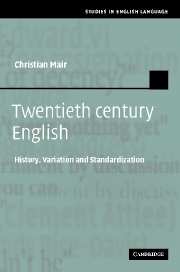Book contents
- Frontmatter
- Contents
- List of figures
- List of tables
- Acknowledgments
- 1 Setting the scene
- 2 Ongoing language change: problems of detection and verification
- 3 Lexical change in twentieth-century English
- 4 Grammatical changes in twentieth-century English
- 5 Pronunciation
- 6 Language change in context: changing communicative and discourse norms in twentieth-century English
- Conclusion
- Appendix 1 Brief survey of the corpora used for the present study
- Appendix 2 The OED Baseline Corpora
- Appendix 3 Estimating text size in the newspaper archives and the World Wide Web
- Appendix 4 A quarterly update of the OED Online (New Edition) – 13 March 2003: Motswana to mussy
- References
- Index
5 - Pronunciation
Published online by Cambridge University Press: 22 September 2009
- Frontmatter
- Contents
- List of figures
- List of tables
- Acknowledgments
- 1 Setting the scene
- 2 Ongoing language change: problems of detection and verification
- 3 Lexical change in twentieth-century English
- 4 Grammatical changes in twentieth-century English
- 5 Pronunciation
- 6 Language change in context: changing communicative and discourse norms in twentieth-century English
- Conclusion
- Appendix 1 Brief survey of the corpora used for the present study
- Appendix 2 The OED Baseline Corpora
- Appendix 3 Estimating text size in the newspaper archives and the World Wide Web
- Appendix 4 A quarterly update of the OED Online (New Edition) – 13 March 2003: Motswana to mussy
- References
- Index
Summary
Introduction
For a long time, standard English was a written language, defined through its orthography, vocabulary, and grammar. The development of standardized prestige accents for spoken communication is a comparatively recent phenomenon. In fact, there are linguists who claim that standard English can be pronounced in any accent even today (e.g., Trudgill 1999). This position is not an unattractive one for its internal consistency but will not be adopted in the present book. To take contemporary Britain as an example, it is true that standard English may come in several accents, but certainly not in all. Apart from RP (“Received Pronunciation”), the accent traditionally associated with it, standard English may be pronounced with a Scottish accent, a general Northern pronunciation, and others, but it is still difficult to imagine standard English in broad Cockney or Liverpool “Scouse.” Such speakers are not found, and there are obvious sociolinguistic reasons accounting for this gap.
Two prominent sociolinguists have drawn attention to an apparent paradox besetting efforts to standardize speech. There is a mismatch between the desire to do so, which has been strong throughout the recent past, and an obvious lack of success in fully achieving the intended goal:
For a number of reasons it is difficult to point to a fixed and invariant kind of English that can properly be called the standard language, unless we consider only the written form to be relevant. It is only in the spelling system that full standardisation really has been achieved, as deviations from the norm (however logical) are not tolerated there.…
- Type
- Chapter
- Information
- Twentieth-Century EnglishHistory, Variation and Standardization, pp. 156 - 180Publisher: Cambridge University PressPrint publication year: 2006



